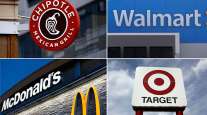Target to Buy Shipt for $550 Million in Challenge to Amazon

Target Corp. agreed to purchase grocery-delivery startup Shipt Inc. for $550 million, stepping up its challenge to Amazon.com Inc. by speeding the rollout of same-day shipping.
The all-cash deal will let Target customers order groceries and other goods online, and then have the items sent directly to their doors from nearby Target stores.
Buying Shipt further beefs up Target’s logistics operations after the retailer earlier this year acquired software company Grand Junction, which also manages local and same-day deliveries. Target now offers same-day delivery in New York City and can send orders from 1,400 of its stores. Competition in this space is growing fiercer, though, as rivals Wal-Mart Stores Inc. and Best Buy Co. also offer same-day service, keeping pace with Amazon.
Target’s decision to buy Shipt, rather than partner with it, “shows how serious they are,” Kantar Retail analyst Robin Sherk said. “One-stop shopping was convenient in the 1990s but for today’s families you have to be able to do instant food delivery as well. It’s also a realization that Amazon, this big technology disruptor, has entered the consumer landscape.”
Four out of five shoppers want same-day shipping, according to a survey by fulfillment software maker Temando, but only half of retailers offer it.
“With Shipt’s network of local shoppers and their current market penetration, we will move from days to hours, dramatically accelerating our ability to bring affordable same-day delivery to guests across the country,” John Mulligan, Target’s chief operating officer, said in a statement.
The deal will give Target same-day delivery at about half of its 1,834 stores by next summer, with the number growing to a majority of stores in time for next year’s holiday season. The service -- costing $99 a year for unlimited deliveries -- will initially encompass categories like groceries, household essentials and electronics before expanding to all major product groups by the end of 2019.
Improved Position
“While it will not affect Target’s capability this holiday season, the fact that Target will have this service in place during 2018 will significantly improve its online competitive position,” Charlie O’Shea, an analyst at Moody’s Corp., said in a note.
Target rose 2.7% to close at $62.67 Wednesday, while the news caused a momentary dip for the shares of Shipt’s existing retail partners, Kroger Co. and Costco Wholesale Corp. Kroger ended the day up 1.4%, while Costco was little changed.
Kroger said it’s still optimistic about the company’s prospects for home delivery after expanding its logistics operations in recent years via partnerships with Instacart Inc. and others.
“We feel really good about the variety of partnerships Kroger has going,” corporate communications head Keith Dailey said. Costco Chief Financial Officer Richard Galanti declined to comment.
Online Preference
Consumers’ increasing preference for shopping online, along with Amazon’s purchase of upscale grocer Whole Foods and its encroachment into new arenas like apparel, have sent retailers scrambling to improve their online offerings. E-commerce sales are up about 17% this holiday season, according to Adobe Systems Inc., and online merchants racked up a record $6.59 billion on Cyber Monday alone, the company found.
The question for traditional retailers is how to handle all those internet orders. They could build their own delivery network, but it’s an arduous and expensive process. That’s why many of them are seeking help from e-commerce startups like Shipt and Instacart.
Founded in 2014, Shipt serves about 20,000 customers through partnerships with retailers including Publix Super Markets Inc., HEB Grocery Co., Kroger and Costco. It will continue to operate independently and plans to expand its business with other retailers, Chief Executive Officer Bill Smith said in an interview.
‘Scale Matters’
“We’ve spoken to a number of our existing partners about this deal and all the conversations have been very positive,” Smith said. “Having multiple retailers allows us to grow our membership base and make it more attractive. In same-day delivery, scale matters.”
For now, Target shoppers will need to pay Shipt’s $99 annual membership fee to gain access to the service. Once a customer orders, they send a “shopper” into the store to grab the groceries, and then deliver the items. Target is working on how to integrate Shipt into its website and mobile shopping app, Mulligan said.
The deal is expected to close before the end of the year and will be “modestly accretive” to Target’s profit in 2018, while boosting online sales, the company said. The retailer’s e-commerce sales already grew 24% in the third quarter.
‘Big Loser’
Target has worked with Shipt’s rival Instacart for same-day service in cities like Minneapolis and Chicago since 2015, and Mulligan said he “will have conversations with them on where we go next.”
“The big loser in this deal is Instacart,” said Cooper Smith, an analyst at business-intelligence firm L2.
Following Target’s announcement, Instacart said it works with more than 165 retailers, including seven of the eight biggest grocers in North America.
“As an independent company, Instacart doesn’t compete with any of our partners,” the company said. San Francisco-based Instacart has recently expanded its partnerships with retailers including Costco, Kroger, Albertsons Cos. and drugstore giant CVS Health Corp.
Target and Shipt began discussing the deal in the middle of the summer, Mulligan said. They decided to pursue an acquisition rather than just a partnership in order to plow Target’s resources into expanding Shipt’s business, and to maintain its current level of customer experience.
Smith will stay in his role, reporting to Mulligan, and its 270 employees will remain in Shipt’s offices in San Francisco and Birmingham, Alabama.



